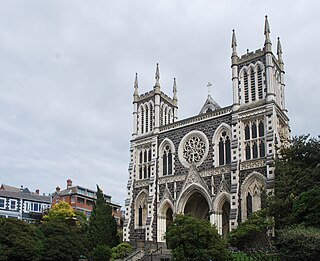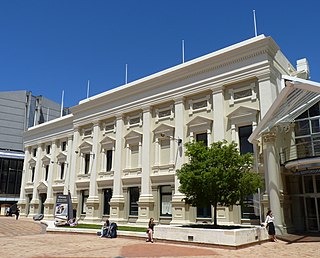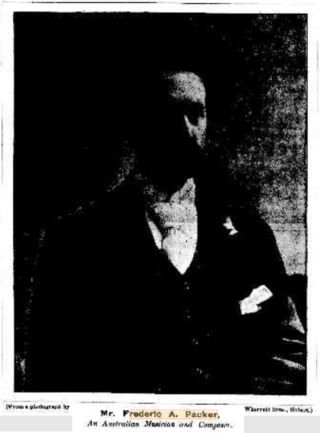Early life
He was born in Leamington, Warwickshire, England on 21 March 1867. He studied piano and composition at the Crystal Palace School in Sydenham, London. [1]

John Maughan Barnett (21 March 1867 – 31 July 1938) was a New Zealand organist, choirmaster, pianist, composer and conductor.
He was born in Leamington, Warwickshire, England on 21 March 1867. He studied piano and composition at the Crystal Palace School in Sydenham, London. [1]

Barnett was organist and choirmaster at churches in Tunbridge Wells and St Leonards, Sussex. [1] In 1890, for health reasons, he emigrated to Hobart, Tasmania. [1] [2] There he was organist and choirmaster at the cathedral, moving to the same position in Napier, New Zealand in 1893. In England, Tasmania and New Zealand he taught, composed and performed on the organ and piano. [1]
From 1895 he was organist and choirmaster at St John's Church in Wellington, becoming city organist in 1908. He became Auckland city in organist in 1912 until he retired in 1932. [1]
While in Wellington Barnett conducted the Wellington Choral Society and Orchestral Society. [2] His Musical Society performed the cantata Hinemoa by Alfred Hill in November 1896 for the Wellington Industrial Exhibition. [3]
Barnett married his first wife Harriett Frances Tugwell in 1889 in Tunbridge Wells. They had three daughters and one son. [1] Their son, Lewin Maughan Barnett, was killed in World War I at Gallipoli. [1] [4] Harriett died in 1925 and Barnett was married again in 1935 to Mary Jameson. [1] He died in Auckland in 1938. [2]
Barnett wrote compositions for piano and organ as well as other works including: [2]

John Stanley Body was a New Zealand composer, ethnomusicologist, photographer, teacher, and arts producer. As a composer, his work comprised concert music, music theatre, electronic music, music for film and dance, and audio-visual gallery installations. A deep and long-standing interest in the music of non-Western cultures – particularly South-East Asian – influenced much of his composing work, particularly his technique of transcribing field recordings. As an organiser of musical events and projects, Body had a significant impact on the promotion of Asian music in New Zealand, as well as the promotion of New Zealand music within the country and abroad.
The following lists events that happened during 1901 in New Zealand.

St Joseph's Cathedral is the cathedral for the Roman Catholic Diocese of Dunedin. It is located in City Rise in the city of Dunedin, New Zealand. It serves as the seat of the bishop of the Latin Church Diocese of Dunedin, which was erected on 26 November 1869.

The Wellington Town Hall is a concert hall and part of the municipal complex in Wellington, New Zealand, which opened in December 1904. It has been closed to the public since the 2013 Seddon earthquake for extensive strengthening work, and is projected to reopen in 2027.

David Goldie was the Mayor of Auckland City from 1898 to 1901 and a Member of Parliament in New Zealand. The artist C. F. Goldie was his son.

Leonard Nowell Fowles was an English organist and choirmaster, classical music composer, arranger, teacher, adjudicator and conductor, best remembered for his hymn tunes "Golders Green" and "Phoenix".
Andrew Perkins is a New Zealand composer, choral conductor and teacher. He has had a number of works recorded and performed internationally.
Victor Edward Galway was a New Zealand music academic, organist, conductor and composer.
John Barnett (1802–1890) was an English composer.

Robert Parker was a New Zealand organist, choirmaster and conductor.

Thomas Vernon Griffiths was an English-born New Zealand conductor, composer, lecturer and music teacher. Known for his dedication to music in schools and the community, Griffiths promoted music education, school music and was active in community music. He composed pieces for schools, churches and amateur musicians.
Maughan is a surname. Notable people with the surname include:
Colin Archibald Campbell Ross (1911–1993) FRCO was an organist, pianist, conductor and composer.

John Matthew Ennis, invariably referred to as Matthew Ennis or J. Matthew Ennis, was an English pianist and organist who had a substantial academic career in Adelaide, South Australia.
Harold Eustace Wylde FRCO, ARCM, LRAM (1888–1975) was a South Australian organist.

Frederick Augustus Gow Packer, generally referred to as F. A. Packer but also Frederick Gow Packer, was an Australian composer of Anglican spiritual and romantic music.
Anthony Jennings was a New Zealand harpsichordist, organist, choral and orchestral director, and academic. A proponent of the early-music movement, he advocated for authentic performing practices. He made several recordings of baroque music on the harpsichord. Musicologist J. M. Thomson wrote, that Jennings's "musical skills were wide-ranging and supported by a charismatic personality. A virtuoso organist, his performances of Romantic and contemporary repertory are remembered for their technical brilliance and musical power, but his special contribution was in the area of Baroque performance."
John Thomas Hill KS RAM was a church organist, choirmaster and orchestra conductor in Australia. He is remembered for his brief marriage to the prima donna Ilma de Murska.

Joseph Gordon Saunders MusD was a composer of songs, church music and organ music. He was also a teacher of composition, piano, harmony and counterpoint at the Trinity College of Music. He was known to have conducted ensemble classes.
Thomas Sharp MCO, was an organist in Launceston and Sydney, Australia, remembered as a member of the committee which drew up the specifications for the Grand Organ in Sydney Town Hall. He was the only dissenter from its final decision. Three of his sons were professional organists.